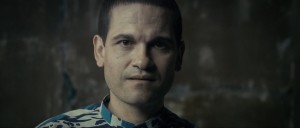By Rohan Murti
However ludicrous it might seem these days, every time the huge screen facing us reads something like: ‘Based on a true story’ or ‘Based on true events’, the brain is priorly readied to believe in some unbelievable hyperbole. ‘The Imposter,’ on the other hand, begins in a rather unorthodox manner, leaving us with no prior clue whatsoever. The humongous amount of grief a family experiences on learning that their child is ‘lost,’ in contrast to their relentless joy on finding him back, forms the crux of this unique documentary.
‘The Impostor’ is a British-American documentary film that revolves around the life of serial impostor Fredric Bourdin, a French criminal, claiming to have impersonated as many as 500 lost children assuming their false identities. Infamously nicknamed as ‘The Chameleon’ by the press, his most controversial impersonation was that of thirteen-year old Nicholas Barclay, who hailed from San Antonio, Texas. Under mysterious circumstances, Nicholas went missing since 13th of June, 1994, while playing basketball with his friends in the morning. Three years and four months later, Nicholas was ‘found’ — but with another identity.

“From as long as I remember, I wanted to be someone else. Someone who was acceptable,” the “boy” says, in a charming accent, betraying remorse, and at the same time creating a very empathetic air about him. Which is why, probably the most intimidating and efficacious part of this stunning story is Fredric Bourdin. Yes, the real-life imposter narrates his own story, which is one of the best and most unsettling aspects of the documentary. As a visibly relaxed and at-ease Fredric speaks to us, it takes us time to adjust to the man’s uncanny-yet-candid ‘confessions’ that form a huge chunk of the narrative. Adam O’Brian plays the younger Fredric, his weirdly flattened nose spookily reminiscent of our devious narrator.
Armed with solid content and a well-structured screenplay, the film is poised to be remembered for its story. But the one factor that bolstered the overall impact is the extremely well-evoked suspenseful narration. A man assuming the identity of a child and further making his family believe in his identity is ridiculously bizarre, and hard to digest. But it happens — often, before our very eyes, re-enacted in docudrama style, giving us a peak into perhaps the most damning exploration of behavioural exposure. Parts in the film where Fredric is worried about facing Nicholas’ sister for the very first time are perversely entertaining, and the irrefutable and unpredictable highs.
entertaining, and the irrefutable and unpredictable highs.
Anna Ruben as Carey Gibson gives a commendable performance, but we’re compelled to sympathise with Beverly Dollarhide, the real-life mother of Nicholas Barclay, as her eyes still reflect the grief of her son’s loss, more so when we see the last frame of the film: “Nicholas Barclay is still listed as a missing person”.
Although the film leaves us lots of questions and an emotional concoction of sorrow and pity, its unique narration and authentic quasi-reportage make it a worthwhile, and most curious, watch.







Leave A Comment
You must be logged in to post a comment.